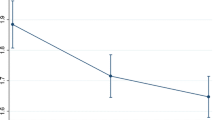Abstract.
This paper examines one avenue through which female autonomy impinges on fertility and child mortality in developing countries. A simple model is set out in which couples are motivated to have children for old age security purposes. The decisions of a couple regarding fertility and allocation of resources for the healthcare of their children are made within a bargaining framework. An increase in female autonomy translating into an increase in the relative bargaining power or the threat point utility of mothers is shown to reduce fertility and also to reduce child mortality rates. Paradoxically, the increase in female autonomy within a household may increase the disadvantage suffered by female children in that household with respect to survival.
Similar content being viewed by others
Author information
Authors and Affiliations
Additional information
Received: 4 August 1999/Accepted: 7 September 2000
Rights and permissions
About this article
Cite this article
Eswaran, M. The empowerment of women, fertility, and child mortality: Towards a theoretical analysis. J Popul Econ 15, 433–454 (2002). https://doi.org/10.1007/s001480100070
Issue Date:
DOI: https://doi.org/10.1007/s001480100070




